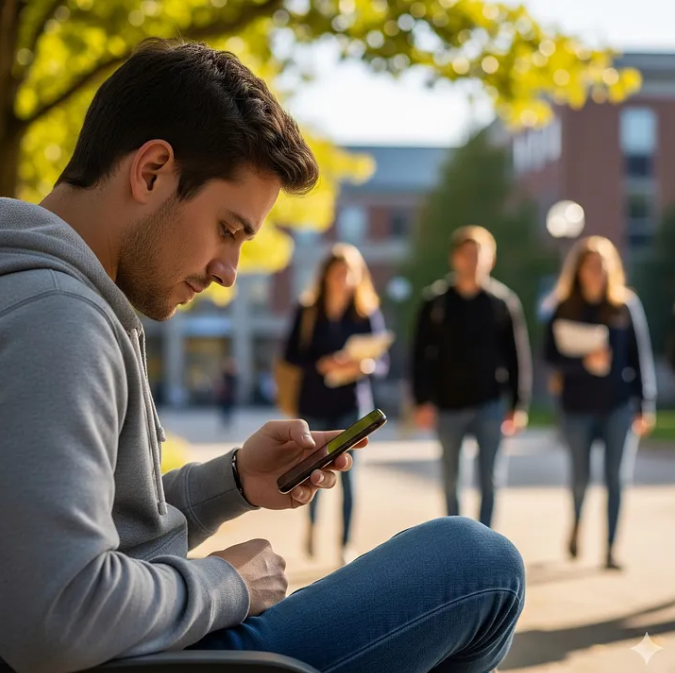.svg)

Is Our Obsession with Screens Impacting Hiring?
Introduction
The benefits of screens and social media in today’s work environment cannot be denied. They enable the use of virtual teams in organizations. They also enable those from across the globe to engage, and interact with, one another. Yet, the heavy use of screens and social media may also have downsides when it comes to how it might passively impact one’s ability to communicate.
The argument here is that these negative effects primarily stem from how they impact one’s ability to socialize and develop relationships. For the sake of this piece, I will focus primarily on Talent Acquisition in organizations, and in particular, interviews.
The Differences Between Virtual Communication and Physical Communication
There are a number of key factors associated with use of screens and social media that may have considerable implications for relationship building during talent acquisition processes.
- Physicality: The extent to which the entire environment/context is accessible to the senses.
- Accessibility and Opportunity: The extent to which a relationship or social system (i.e., an organization) is perceived as available to the focal individual.
- Latency: The extent to which relationship building requires communications to occur in real time.
- Interdependence: The extent to which communication requires intensive, reciprocal interaction.
- Synchronicity: The extent to which building a relationship or socializing within an organization requires being temporally aligned with communications of others.
- Permanence: The extent to which communication episodes are short-lived or long-term in nature.
How Screen Reliance Hurts In-Person Interviews for Young Job Seekers
A heavy reliance on screens for entertainment can atrophy social skills essential for face-to-face interactions. Below, I will outline a number of ways in which these habits might negatively impact job seekers during in-person interviews.
- Reduced Nonverbal Communication Skills: Social media and digital entertainment often lack the nuances of face-to-face communication. This can lead to a reduced ability to read and interpret nonverbal cues like facial expressions, body language, and tone of voice. A job seeker might miss an interviewer’s subtle signal to expand on a point or wrap up a long answer.
- Difficulty with Real-time Conversation: Online communication is often asynchronous and allows for editing responses. In an in-person interview, a job seeker must think on their feet, be spontaneous, and respond immediately. The habit of delayed or controlled responses from screen use can make them seem slow, unprepared, or awkward during a live, unscripted conversation.
- Decreased Empathy: The lack of physicality and a focus on curated online personas can diminish empathy. In an interview, the ability to connect with and show empathy for the interviewer is a powerful relationship-building tool. A job seeker who’s spent excessive time on screens may struggle to make that human connection, making them seem detached or less personable.
- Shorter Attention Span: The constant stimulation of social media and video content can lead to a shorter attention span. During an interview, this might manifest as an inability to maintain focus, leading to a disorganized or rushed presentation of ideas and a struggle to listen intently to the interviewer’s questions. This can be perceived as disinterest or a lack of professionalism.
So Where Do We Go From Here?
To address the negative impacts of screen reliance on job seekers’ interview skills, universities and students must take a proactive, multi-pronged approach that focuses on both structured programs and individual habits.
Universities and Career Services
Universities and their career services departments are perfectly positioned to help students bridge the gap between digital and in-person communication.
- Integrate In-Person Skills into Curricula: Instead of just mock interviews, universities should incorporate communication skills, body language, and etiquette into broader curriculum. This can include: Public speaking courses that emphasize spontaneous, unscripted responses; Group projects that require in-person meetings and presentations to foster interdependence and synchronous communication; Workshops on nonverbal communication, helping students learn to read body language, maintain eye contact, and use physical space effectively.
- Offer a Variety of Mock Interviews: While video mock interviews are useful, universities should also prioritize in-person practice. This can involve: Realistic, in-person mock interviews with staff, alumni, or volunteer recruiters. These should replicate the physical environment of an office; Role-playing scenarios that go beyond just Q&A, simulating networking events, career fairs, and casual conversations to build rapport and relationship-building skills; “Reverse” mock interviews where students act as the interviewer, forcing them to practice active listening, ask follow-up questions, and gauge a candidate’s nonverbal cues.
- Promote Empathy and Active Listening: Universities can create programs specifically to develop empathy, a skill often stunted by screen use. Examples include empathy-based interview training where students are taught to ask open-ended questions and listen for deeper meaning and emotion, not just factual answers and structured reflection sessions after mock interviews to discuss not just what was said, but how the conversation felt and how each person’s nonverbal communication influenced the interaction.
- Adopt Platforms such as Scoutr that offer science-based education and training for students on the differences between virtual and in-person interviews as well as how to maximize their chances at obtaining a job in the context of the latter.
Students
Students have a significant role to play by being intentional about their own habits and seeking out opportunities to practice these skills.
- Prioritize In-Person Socializing: Students should actively seek out opportunities for face-to-face interaction to strengthen their in-person communication skills. Join clubs, volunteer for on-campus events, and participate in study groups. Make an effort to engage in conversation with professors and peers without the aid of a screen.
- Practice Active Listening: Students can train themselves to be better listeners by putting away their phones during conversations, making eye contact, and focusing on the other person’s body language. They should practice: Echoing and paraphrasing what the other person said to confirm they understand; Asking clarifying questions and avoiding the tendency to interrupt or anticipate a response.
- Be Intentional about Screen Use: Students should recognize how their entertainment habits might be affecting them and take steps to mitigate the effects. Schedule “screen-free” time for focused work and human interaction. Practice self-control by turning off notifications and placing their phone away during important conversations or study sessions.
- Leverage University Resources: Students should take full advantage of the services their university offers. Schedule multiple mock interviews, both in-person and on video, to become comfortable with different formats. Attend career fairs and networking events to practice spontaneous, face-to-face conversations with recruiters and company representatives. Seek out mentoring opportunities with alumni or professionals to learn firsthand how to build and maintain relationships in a professional context. Create profiles on platforms such as Scoutr that offer science-based education and training on the differences between virtual and in-person interviews as well as how to maximize their chances at obtaining a job in the context of the latter.
Latest Articles
Interviews. Applications. Candidate recruiting. Employee onboarding. The world of recruiting has no limit. Start with our blog if you don’t know where to begin.




